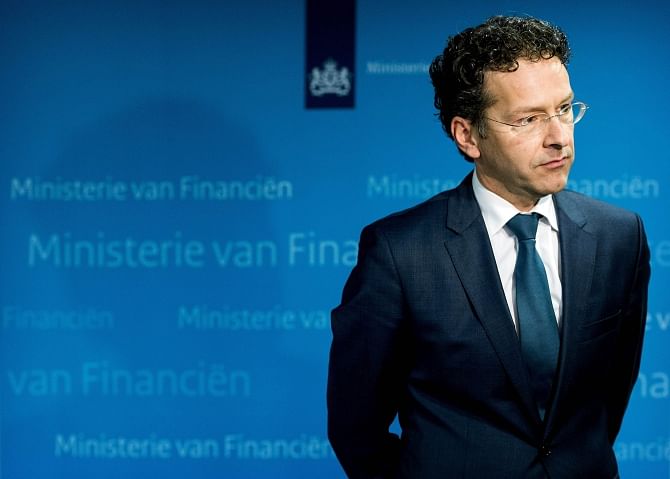Four in five eurozone banks pass ECB health test

A large majority of eurozone banks were given a clean bill of health Sunday by the European Central Bank, fuelling hopes that a major cause of economic uncertainty could soon be eliminated, analysts said.
In the most in-depth and stringent audit of eurozone banks ever undertaken -- aimed at preventing a repeat of the crisis that nearly led to the euro's collapse -- the ECB found that 25 out of a total 130 banks had a combined capital shortfall of 25 billion euros ($31 billion) at the end of 2013.
However, of those, 12 banks have already since made up 15 billion euros of the shortfall, leaving 13 banks with a hole in their combined balance sheets of around 10 billion euros.
And that is a small figure compared with total banking assets of 22 trillion euros in the single currency area, analysts said.
"A period of stress and uncertainty ends for eurozone banks with the end of the exercise," said Berenberg Bank economist Christian Schulz.
"You can say the banking sector is in good health, generally," said Damien Leurent of the Deloitte financial consultancy.
The need for the ECB's milestone comprehensive assessment -- carried out before the central bank assumes the role of European banking supervisor on November 4 -- has become more pressing in recent weeks.
Fears of deflation and a possible new recession in the region have increased as economic growth stalls in its biggest economies.
However, no major lender in any of the 19 countries under review -- the eurozone plus Lithuania -- flunked the ECB's unprecedented year-long test.
Among those that did fail, nine were in Italy, including Banca Monte des Paschi and Banca Popolare di Milano, three were in Greece and three in Cyprus.
Banks with shortfalls must prepare capital plans within two weeks and have up to nine months to cover the gaps.
In Rome, the Bank of Italy insisted that most of the nine Italian banks had already taken measures to address their capital shortfalls and the results "confirm the solidity of the banking system as a whole in Italy".
In Spain, where just one bank, Liberbank, failed, the Spanish central bank said the findings underlined the success achieved by Spanish banks in getting themselves back on a sound footing.
In Austria too, only one bank, OeVAG, fell through the cracks, and the finance ministry there said it had "already begun structural measures and thereby created the conditions for its stabilisation. All in all the results show that in recent years Austria's banks have become more crisis-resistant."
In Germany, where a lesser known bank called Muenchener Hypothekenbank failed, Finance Minister Wolfgang Schaeuble said the results "confirm my impression that German banks have done their homework".
The ECB itself believed the audit "will boost public confidence in the banking sector," its vice president Vitor Constancio told a news conference.
"This should facilitate more lending in Europe, which will help economic growth."
In Brussels, too, the European Commission praised the tests, saying they would "provide a high level of transparency on EU banks' balance sheet".
Daniele Nouy, who heads the new single supervisory body within the ECB, said that "we have achieved a lot in this comprehensive assessment. But at the same time, it is just a starting point for a new task under banking supervision."
The capital shortfalls did not look large enough to cause major concern for any eurozone member state, noted Berenberg's Schulz.
"The good news is that the banks which passed -- the great majority after all -- can now take a deep breath and hopefully concentrate on their core business of funding the real economy. We expect the test to boost banks' appetite to lend gradually," he said.
The key task now will be to prove that the test was tough enough and that anything that was missed can be quickly resolved, the expert added.
Previous banking stress tests in Europe, the latest in 2011, failed to expose serious problems in a number of key financial institutions. In fact, some were given a clean bill of health only to need rescuing just months later.
IHS Global Insight economist Howard Archer said it would be a "very welcome and positive development if the ECB's bank stress tests really do bolster confidence in the eurozone's banking sector".
"But this will by no means be sufficient in itself to turn around the eurozone's currently poor economic fortunes," he cautioned.
"There remains a pressing need for a greater policy focus on growth in the region, underpinned by genuine commitment to structural reform. An easing of global geopolitical tensions and economic uncertainties would also be helpful to business confidence across the eurozone."

 For all latest news, follow The Daily Star's Google News channel.
For all latest news, follow The Daily Star's Google News channel. 



Comments